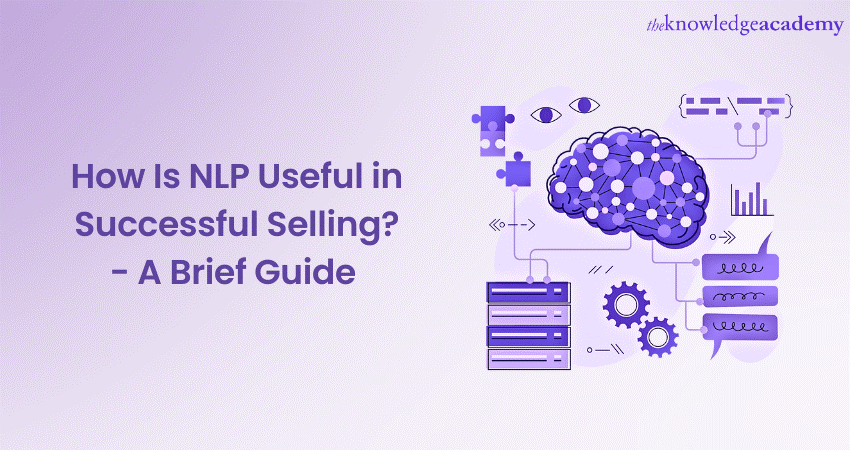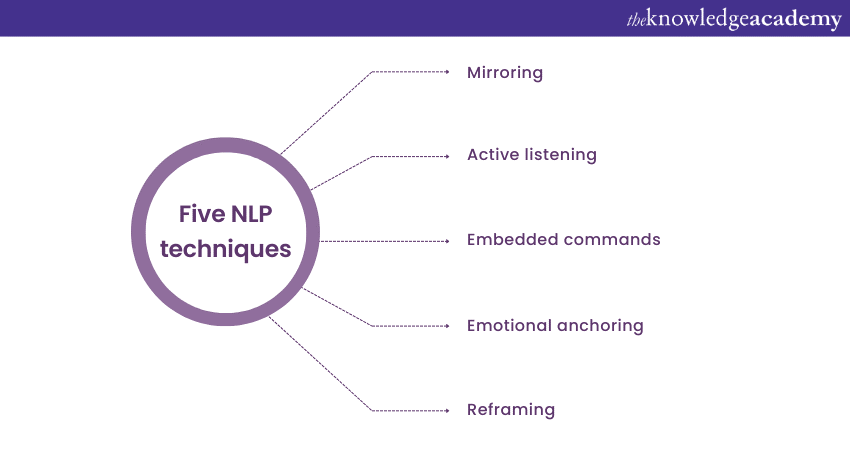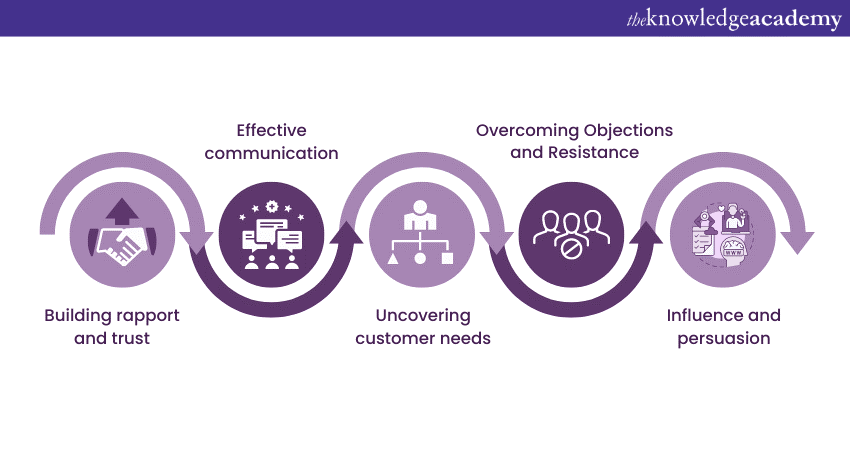We may not have the course you’re looking for. If you enquire or give us a call on +55 8000201623 and speak to our training experts, we may still be able to help with your training requirements.
Training Outcomes Within Your Budget!
We ensure quality, budget-alignment, and timely delivery by our expert instructors.

The significance of effective communication remains intact in every industry and profession, especially in sales. One powerful technique that can significantly impact sales outcomes is Neuro Linguistic Programming (NLP). It combines psychology, linguistics, and behavioural patterns to influence human behaviour and improve communication skills. Although the question remains, How is NLP Useful in Successful Selling?
Within the realm of sales, the Neuro Linguistic Programming techniques offers a diverse range of techniques and strategies that empower sales professionals to connect with customers on a deeper level, uncover their needs, and guide them towards making favourable buying decisions. In this blog, you will learn How is NLP useful in successful selling and about its various techniques.
Table of Contents
1) NLP – An overview
2) NLP techniques
a) Mirroring
b) Active listening
c) Embedded commands
d) Emotional anchoring
e) Reframing
3) Different ways in which NLP improves sales performance
4) Conclusion
NLP- An overview
NLP is a methodology that combines psychology, linguistics, and behavioural patterns to understand and influence human behaviour. It explores the relationship between a person's thoughts, language, and actions, aiming to improve communication, personal development, and interpersonal relationships.
At its core, NLP suggests that an individual's experiences and perception of the world are subjective and can be influenced by language and thinking patterns. Individuals can change their behaviours and achieve desired outcomes by understanding and modifying these patterns.
Although initially developed as a therapeutic approach, NLP has applications in various fields, including business, sales, coaching, education, and personal development. In the context of successful selling, these techniques can help sales professionals in various ways.
NLP techniques

NLP techniques are powerful tools that enhance communication, build rapport, and influence customer behaviour. Here are five highly effective NLP techniques that can significantly impact sales success:
Mirroring
Mirroring is an NLP technique that subtly imitates the body language, speech patterns, and gestures of the person you are interacting with. By mirroring these aspects of communication, you create a sense of familiarity and connection, which helps to build a relationship with the buyer.
Pay attention to the customer's posture, tone of voice, and pace of speech, and subtly align your body language and communication style accordingly. This technique establishes a subconscious bond and promotes a positive relationship with the customer.
Active listening
Active listening is a vital NLP technique that focuses on fully understanding and engaging with the speaker during a conversation. It involves being fully present and empathetic, allowing the sales professional to gather valuable information and establish a deeper connection with the customer.
There are several strategies to practice active listening. Firstly, maintaining eye contact shows genuine interest, which signals that you are fully present and attentive to the customer's words and non-verbal cues.
Additionally, nodding and using verbal cues such as "yes" and "I see" demonstrate that you are actively processing and acknowledging what the customer is saying. Active listening allows sales professionals to comprehensively understand the customer's needs, enabling them to tailor their approach and provide more relevant solutions.
Embedded commands
Embedded commands are subtle linguistic patterns that deliver suggestions or commands within a normal conversation. By embedding commands within your speech, you can influence the customer's subconscious mind and guide their thoughts and actions.
For example, instead of saying, "You should consider this product," you can say, "As you explore this product, you'll notice its value." The embedded command is "explore this product," gently encouraging the customer to take action without sounding forceful. Carefully selecting and delivering embedded commands can have a persuasive impact on customers' decision-making.
Emotional anchoring
It is a powerful technique in NLP that involves associating a specific emotional state with a particular trigger or anchor. The anchor can be a physical gesture, a touch, a word, or any sensory stimulus that acts as a cue to access the desired emotional state.
Emotional anchoring begins by eliciting and intensifying a desired emotional state, such as confidence, enthusiasm, or trust. This can be achieved by recalling past experiences or imagining future successes.
At the peak of the emotional state, the anchor is introduced, providing a unique stimulus that triggers the same emotional response. Through repetition and reinforcement, the anchor becomes associated with the emotional state, allowing sales professionals to access and anchor the desired emotion.
Reframing
Reframing involves shifting the perspective or meaning of a situation to create a more positive or beneficial interpretation. Reframing can help you handle objections and turn potential obstacles into selling opportunities. When a customer presents an objection or expresses a concern, reframe it by highlighting the positive aspects or offering a different perspective. For example, if a customer says, "This product is too expensive," you can reframe it by saying, "While it may have a higher upfront cost, consider the long-term value it provides and the savings it can generate." By reframing objections, you can address customer concerns and redirect their focus to your product or service's benefits and value
Unlock your potential and enhance your communication skills with our NLP Training courses now!
Different ways in which NLP improves sales performance

In the sales world, many factors affect sales success other than effective communication, like body language, demeanour, etc. The following are some of the ways in which NLP can enhance sales performance:
Building rapport and trust
NLP techniques provide sales professionals with tools to establish rapport and build trust with potential customers. Salespeople can create a sense of familiarity and connection by observing and mirroring prospects' body language, speech patterns, and gestures. This rapport-building technique helps establish a positive relationship, enabling smoother communication and increasing the chances of successful sales outcomes.
Effective communication
NLP equips salespeople with the ability to adapt their communication style to match that of their customers. By understanding and utilising different representational systems (visual, auditory, kinaesthetic), sales professionals can tailor their language and delivery to resonate with the customer's preferred way of processing information. This enhances understanding, improves engagement, and effectively conveys the sales message.
Uncovering customer needs
Salespeople can use NLP techniques such as active listening and precise questioning to uncover customers' underlying needs, desires, and motivations. By paying attention to verbal and non-verbal cues, sales professionals can understand the customer's language patterns, values, and decision-making processes. This deep understanding allows for a more personalised approach, enabling salespeople to offer tailored solutions that meet the customer's needs.
Overcoming objections and resistance
NLP provides sales professionals with strategies to handle objections and overcome resistance effectively. Salespeople can redirect negative responses into positive outcomes using techniques like reframing, anchoring, and pattern interruption. It helps sales teams identify the underlying concerns behind objections and address them in a way that alleviates customer doubts and builds confidence in the proposed solution.
Influence and persuasion
NLP techniques can be powerful for influencing and persuading customers. By understanding and utilising language patterns, salespeople can compellingly frame their messages. Techniques such as storytelling, embedded commands, and metaphorical language can be employed to engage customers deeper and motivate them to take action. NLP enables sales professionals to create persuasive narratives that resonate with customers' emotions and aspirations.
Master the various uses of NLP and learn to use it in your profession effectively with our NLP Foundation And Practitioner Training course now!
Conclusion
NLP offers valuable insights and techniques that can significantly enhance the effectiveness of sales strategies. We hope this blog has shed light on your questions like 'How is NLP Useful in Successful Selling?' and helped you learn about its various techniques and methods to improve the outcome of sales.
Unleash the power of Neuro-Linguistic Programming and excel in communication. Sign up for our Neuro Linguistic Programming course now!
Frequently Asked Questions
Upcoming Business Skills Resources Batches & Dates
Date
 Neuro Linguistic Programming
Neuro Linguistic Programming
Fri 17th Jan 2025
Fri 21st Feb 2025
Fri 4th Apr 2025
Fri 6th Jun 2025
Fri 25th Jul 2025
Fri 7th Nov 2025
Fri 26th Dec 2025







 Top Rated Course
Top Rated Course



 If you wish to make any changes to your course, please
If you wish to make any changes to your course, please


